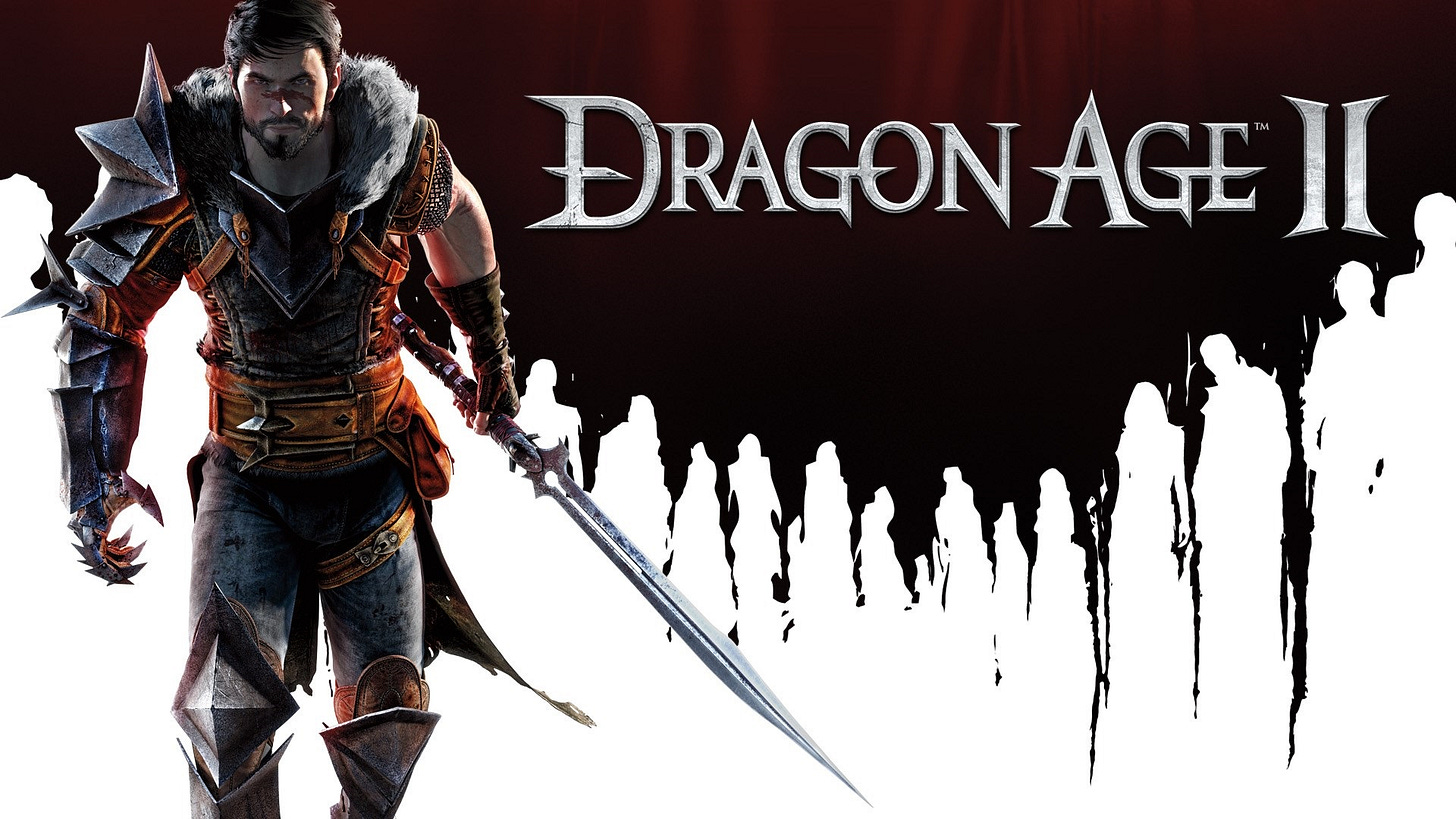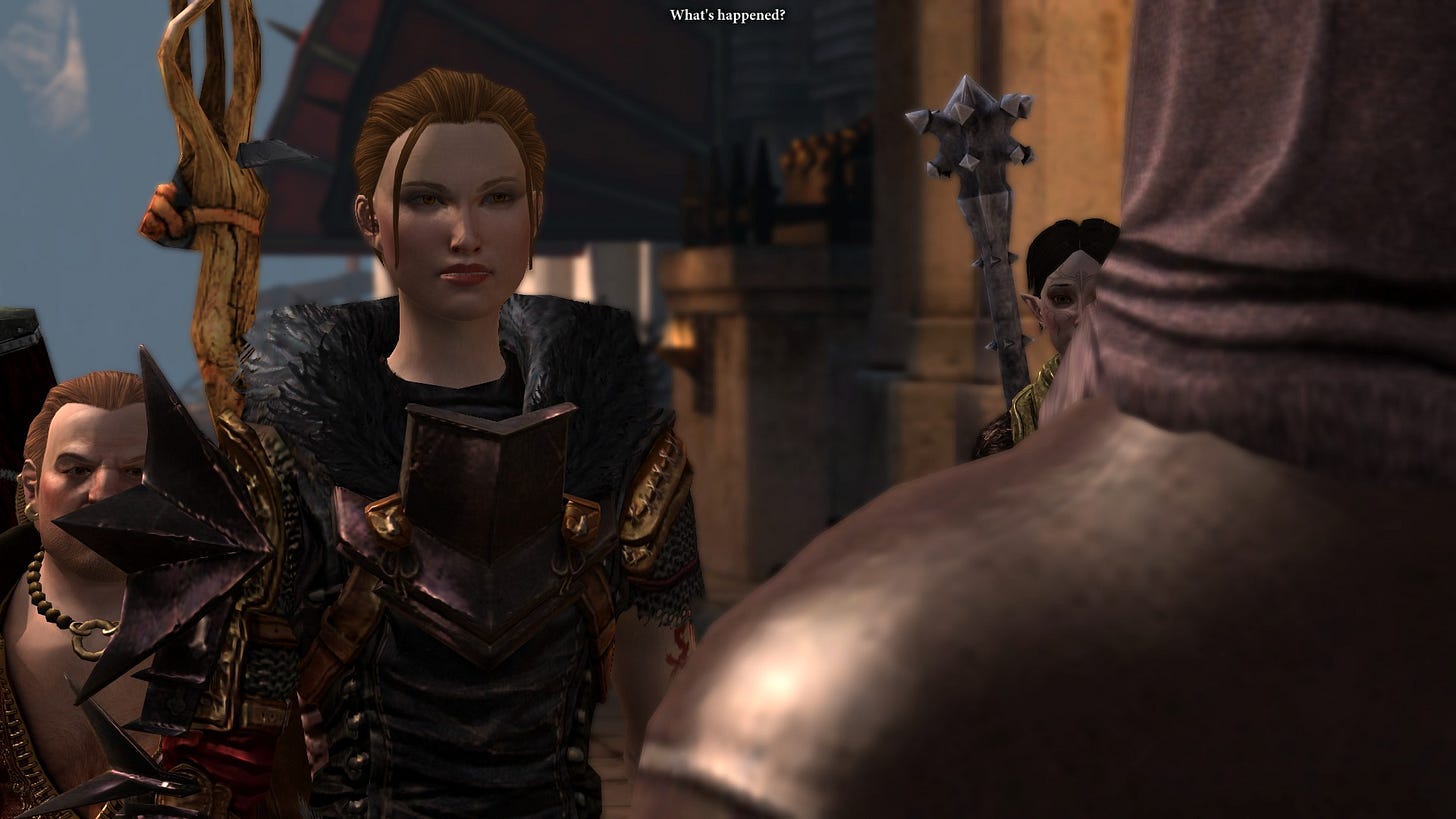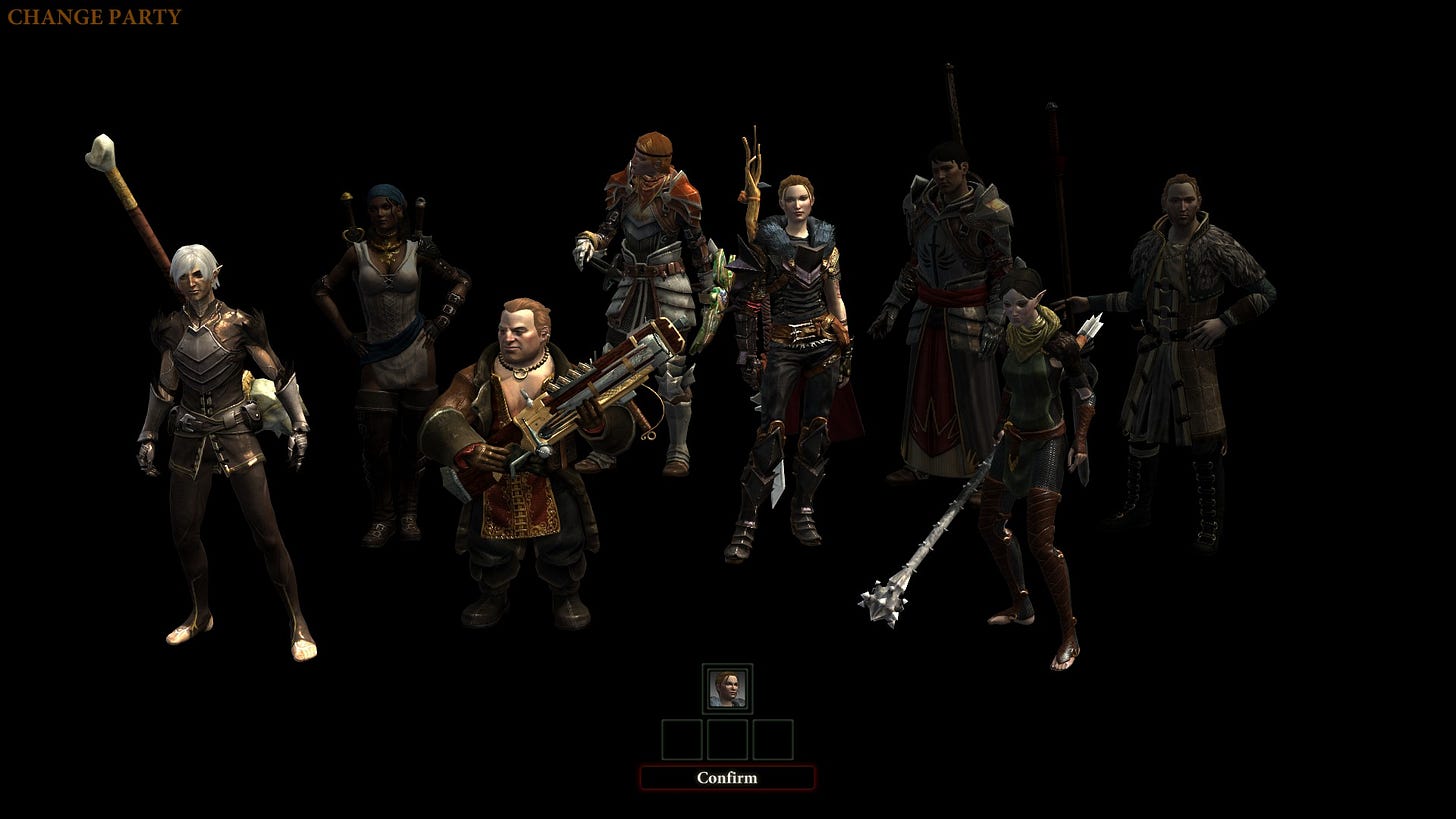Ten Years of Dragon Age II
It's been ten years since the release of Dragon Age II. Is it really as bad as I thought it was at age 13?
Ten years ago today Dragon Age II came out for PC. Strange to think its release was only twelve months after I first played and fell in love with Origins; I remember feeling as though I'd waited an eternity to find out what happens next. It's been seven years since Inquisition and the wait still doesn't feel as long as that one did.
Dragon Age II does not tell us what happens next. In fact, retrospectively, it doesn't feel much like its own game at all. II is an intermission, a strange, rushed detour on the road to the real sequel to Origins, which Inquisition most definitely is.
I did not like this game in 2011. I was 13 and I was tremendously disappointed. I disliked the characters, the combat, the level design, the undriven story, and, of course, the fact that there were only three environments copy-and-pasted seven thousand times.
But over the years since, as so often is the case in gaming, I've witnessed the Regression to Critical Acclaim. Now many Dragon Age fans say that II was much better than we initially thought. Now some people say that II is the best game in the series.
Are they right?
The tenth anniversary seemed like the right time to replay the game and find out for myself.
Setting the Stage
Basically every BioWare game since Baldur's Gate has been a big epic fantasy quest adventure in which the player is some kind of chosen one who sets off to save the world/galaxy/universe/whatever. One of the main sources of praise for Dragon Age II is that it does not do this. Instead, Dragon Age II follows the life of a Fereldan refugee named Hawke as she arrives in the city of Kirkwall and becomes a legend.
The story, therefore, is more personal, more limited in scope, and lower stakes overall. Whether or not this is a good thing, or deploys successfully, is a complicated question, but allow me to make it clear here that I still do not like this game. I think it is not uninteresting but, overall, fails to operate successfully. There are a lot of reasons why.
But first, let's go over the reasons why I do not dislike this game.
Gameplay
Why it is BioWare sticks to the horrible Infinity Engine combat for their Dragon Age games I'll never know. Yes, Origins was a spiritual successor to the Baldur's Gate series, so it made sense at the time. But the appeal of DA was and remains today primarily its characters, then its storytelling, then its setting, then the voice acting, then the art design, then reading the Codex entries, then watching the game download on Steam, and then gameplay--in that order.
An action game like The Witcher 3 or Mass Effect would undoubtedly have a broader appeal than the horrible kludge MMO x D&D combat that all three of these games have. Does anyone actually like the gameplay in Dragon Age?
Apparently so. When II came out there was much fury over the "dumbing down" of the preposterously overdesigned systems of the first game, in which each character had upward of forty active abilities on their action bar at a time.
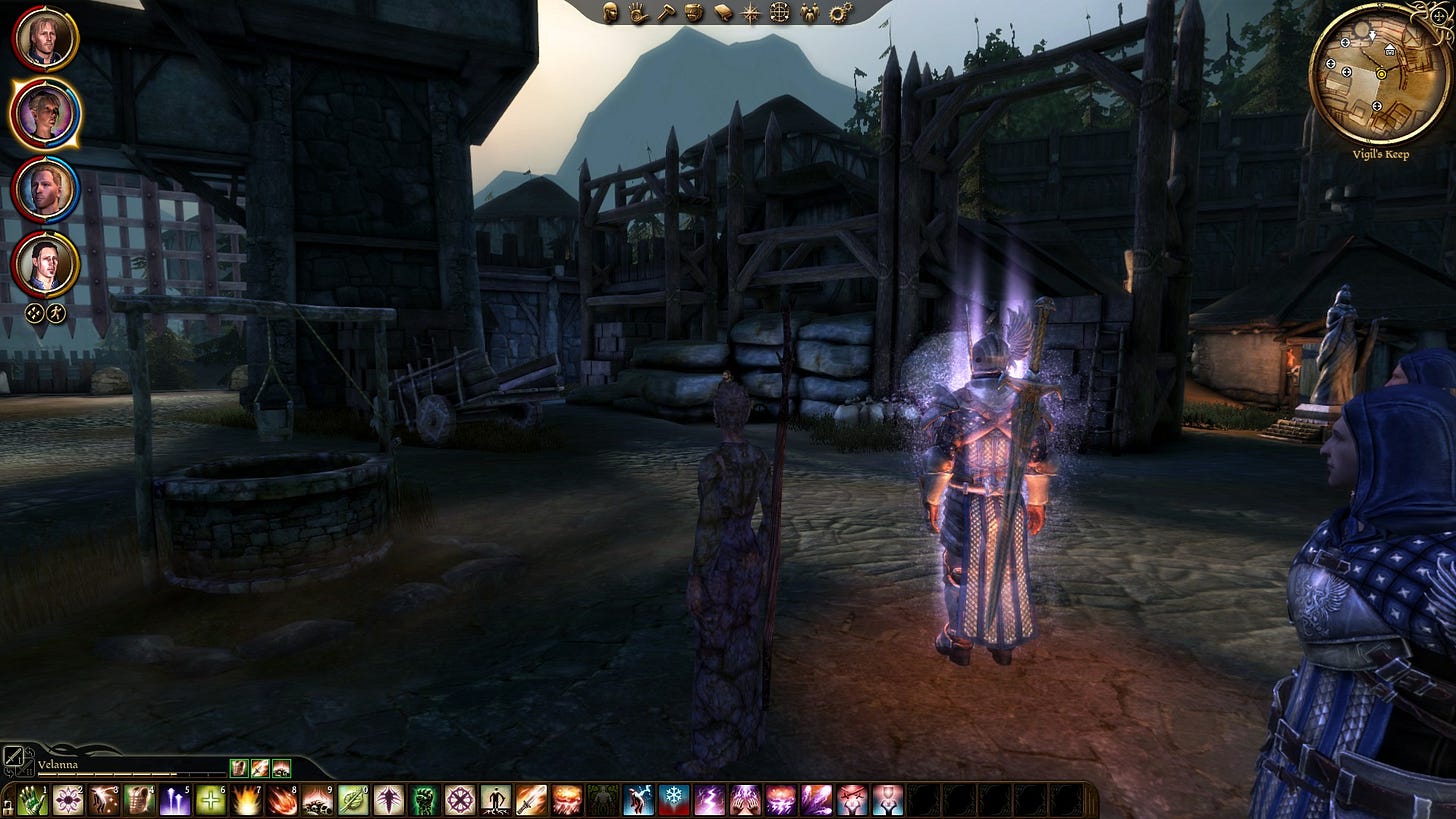
This was mercifully reduced in the sequel. In addition, you no longer micromanage your companions' armor, enemies die more quickly in combat, and if playing on easy mode you can worry less about actually having to engage with the mechanics to win every encounter and instead spend that time checking out Isabela.
These are positive changes.
II's combat was a step in the right direction. The simplification of the arcane systems in the first game should have only upset the mentally deranged. I wish they had gone further and just made Dragon Age 2 an action game ala The Witcher 2 and 3, but I guess that would be asking too much.
Many people who criticize this game also point to the atrocious and repetitive level design. This obviously comes about due to time constraints, as Dragon Age II is one of the most rushed games you will ever hear discussed positively. Most of the game takes place in underground caves, all of which use the exact same art assets, or in Kirkwall's streets, which are ugly, brown, and bland. Enemies spawn in waves, leading to over-long, padded, tedious combat encounters.
This much is indefensible. No one will argue otherwise. Honestly, though, I don't care. Yeah, the art and level design are all rushed and repetitive and bad. They certainly don't make the game any better. But if the narrative design were good all of this I could endure.
So let it be known that I'm no Origins fanboy who complains because things are different, nor am I someone who is particularly bothered by the low production quality of the game as a whole. No, my issues with II are almost entirely narrative, so that's what I want to spend the remainder of my time analyzing.
A Caveat
While I say that gameplay changes aren't what breaks II for me, there's one important exception: the combat of a Dragon Age game is not well-suited for a "personal story." The need of the level designers to constantly shoehorn in gameplay sequences demonstrates this.
In the first game, when you're traveling, it makes sense to be assailed by darkspawn. But it doesn't really make sense for Hawke to be attacked every sixteen inches by suicidal gang members when she's strolling down the streets of Kirkwall.
If DAII was really going to tell an intimate narrative, it needed to dial back on the combat. They didn't. This leads to quite a lot of dissonance between the systems of the game and its story. The combat in II very rarely feels like it serves some purpose; most of the time it just feels like padding.
(And were it not for that padding, I think I would have finished this game in ~5 hours, rather than the ~20 it ended up taking me.)
On to Narrative
There are three pillars to the narrative of DAII to dissect when interrogating the question "is this game actually any good?" They are: the story, the characters, and the Hawke.
Let's start with the Hawke.
Commander Hawke
Whereas Origins allows you to choose from a number of different starting scenarios for your PC, and allows you to customize to your heart's content, Dragon Age II always stars up-and-coming comedian [First Name] Hawke. I imagine Hawke's inception went something along the lines of this:
EA: "Mass Effect 2 made more money than Dragon Age: Origins. Your next game should star fantasy Commander Shepard."
BioWare: "k"
And that was that.
I've argued elsewhere on this blog that RPGs should strive to give the player more to work with in terms of protagonists. The Witcher works so well because it does precisely this.
But the problem with Hawke, and in fact the Herald of Andraste, and to be honest Shepard himself, is that they exist in a tremendously shaky middle ground of personality. They aren't me, but they also aren't characters in and of themselves.
In Origins it is very easy to pretend that I am Aedan Cousland, youngest son of the Teryn of Highever. This allows me to approach the setting from my own real-life subjective view. I can make moral choices that make sense to me as a human being. I don't have to 'roleplay,' as it were--I can just play and let decisions flow from my real personality.
So when Morrigan falls in love with the PC, she isn't falling in love with Aedan. She's falling in love with me.
This is very powerful. There are flaws to this approach, numerous beyond count, but this is why the Hero of Fereldan ranks more popular than Hawke or the Herald of Andraste in fan polls. There's something magical that can work on the player in these voiceless protagonist RPGs, especially in terms of relationships.
This is not an option in the post-Mass Effect era, in which every AAA RPG uses dialogue wheels--presumably for commercial (and not artistic) reasons.
The issue therein is that unlike Geralt Hawke has no real charm or personality (or, most importantly, 'voice'). Her options for dialogue are always three: nice, asshole, or snark. Because the game lacks any alignment system I bounce between all three without discretion, in a manner that could perhaps be illustrated thusly:
Cullen: "The mages are all turning into abominations! We have to do something before it's too late! Let's kill all of them!"
Hawke: "Agreed. We can suffer not the abomination to live."
Cullen: "How do you want to attack the Gallows, serah?"
Hawke: "I thought I'd try tickling my way in through the front door, wouldn't that be so charming?"
Even at age 13 I found the snark option to be absurd in basically all scenarios, but especially at the climax. The tone disintegrates.
For this latest playthrough I did my best to stick with Asshole Hawke, because quite frankly the people of Kirkwall deserve it and worse, but I still found the character to have no meaningful, consistent voice. Only ever choosing one of the three types of responses certainly helps alleviate this problem, but if that's how the game is going to be written, why not have us choose our personality type at the start of the game and eliminate the dialogue system altogether?
To illustrate this point I want to perform a favorite exercise of mine. Let's compare and contrast Geralt from the Witcher with Hawke from Dragon Age II, using simple descriptors and adjectives:
Geralt of Rivia: laconic, cool, slutty, likes nice things even though he's a homeless person
[First Name] Hawke: ..
Geralt of Rivia: hates portals, is fundamentally just, dedicated to his code, lil bit sassy
[First Name] Hawke: ..makes inappropriate jokes?
You can perform the same exercise with the Herald of Andraste and with Commander Shepard both. What is there to the personality of these characters, when contrasted with a real character like Geralt?
Basically nothing. I'm not being facetious. I can't think of anything serious at all.
And yet there's just enough there, by virtue of being voiced, that I can't insert myself as I can in Origins. The end result is the worst of both worlds. I have no attachment to my Hawke whatsoever. I don't understand her, I don't particularly like her, and I don't care about her. She doesn't feel like a real person in any respect, but she also doesn't feel like she's me. This is why Hawke stands no chance against Loghain or Alistair when it comes for sacrifice time in Inquisition. I'd kill a thousand Hawkes to save one Loghain--not because Loghain is a good guy, but because he's far more interesting.
Once again the lack of any alignment system exacerbates this issue, since my Hawke behaves completely erratically depending on which dialogue option I choose. But more than that, she speaks erratically. There's nothing consistent to the way she's written.
I am not against voiced RPG protagonists in theory. In theory I'm in favor of reducing player options in character creation and giving us a more interesting protagonist to inhabit instead, particularly because I only ever play humans in Dragon Age anyway. What I am against is the implementation of a voiced protagonist in Dragon Age II in particular. Hawke is not interesting. Hawke is nothing.
Alas Hawke is not the only character I dislike in this game.
Characters, More Generally
I love the companions in Origins. They all possess unique, original character voices. They all speak in distinct ways. They all have their own things to make them stand out. Morrigan is the best character in all of video gaming, and Sten, Alistair, Leliana, Loghain, and Oghren aren't far behind--although they're not all as psychologically deep as Morrigan, it must be said.
My biggest problem with II when it came out was that I did not like its characters. Any of them. At all. I remember loving Anders in Awakening, but in II I thought he was whiny and insane. The only exception was Varric, who was fun. This was what broke the game for me.
A lot of people did not agree with me. A lot of people really liked DAII's cast.
This was where I was certain I must have missed something, especially considering I so adore David Gaider's writing--and I think Inquisition's characters are nearly as good as Origins'. It was in the characters of this game that I expected to discover something I had missed as a teenager.
Was I wrong about this game's cast?
No. Let's go over them one at a time:
Carver: He's...the little brother who complains a lot.
Anders: He's an insane abomination who murders innocent people and can't control himself, and also whines a lot, and dooms Thedas to a horrible genocidal war between two equally evil factions.
Merrill: Although endearing in her dialogue, she's an insane blood mage who makes deals with demons like an idiot and condemns multiple people to die for basically no reason, and she also betrays you immediately when tempted by a demon.
Isabela: She's a sexy slutty pirate. She makes sex jokes! Isn't that funny? Sex! Oh, she's also personally responsible for the war with the Qunari--I hope that doesn't bother you.
Aveline: She's a woman. With a sword. Her husband ded. She gets angry at you if you give her a gift and even angrier still if you do favors for her. She's an enormous asshole. She is NPC equivalent of a dry salad.
Fenris: He's an edgy elf with a big sword and an anime haircut. His voice actor recorded his lines from his living room couch.
Varric: Finally, a charismatic character! Varric has style and charm. He's funny, he's cool, and he's easy to get along with. He's also not criminally insane or genocidal or prejudiced, unlike every other companion in this game.
Aveline and Carver are fucking boring and annoying. Anders and Merrill are absurdly dangerous, deranged, and in real life deserve to be executed on the spot, even though I do not strictly dislike either of their personalities. Isabela is fun to have around but has no depth and also deserves to die. Fenris is so edgy that I'd rather swallow razorblades than have him in my party. Once again we're left only with Varric.
Obviously these are subjective judgements. Some people will get along these characters better than I do. For me, these characters do not work, and to be honest I don't understand what people see in them.
Where, oh where, have my dialogue trees gone?
I deeply miss the companion dialogue trees of the first game. Going to camp and interrogating Morrigan about her mother, or Alistair about the Gray Wardens, or hearing Leliana tell stories, was and remains today my favorite part of Origins. Voiceless dialogue trees are awkward, but they do give some kind of a sense that you're actually talking to these characters.
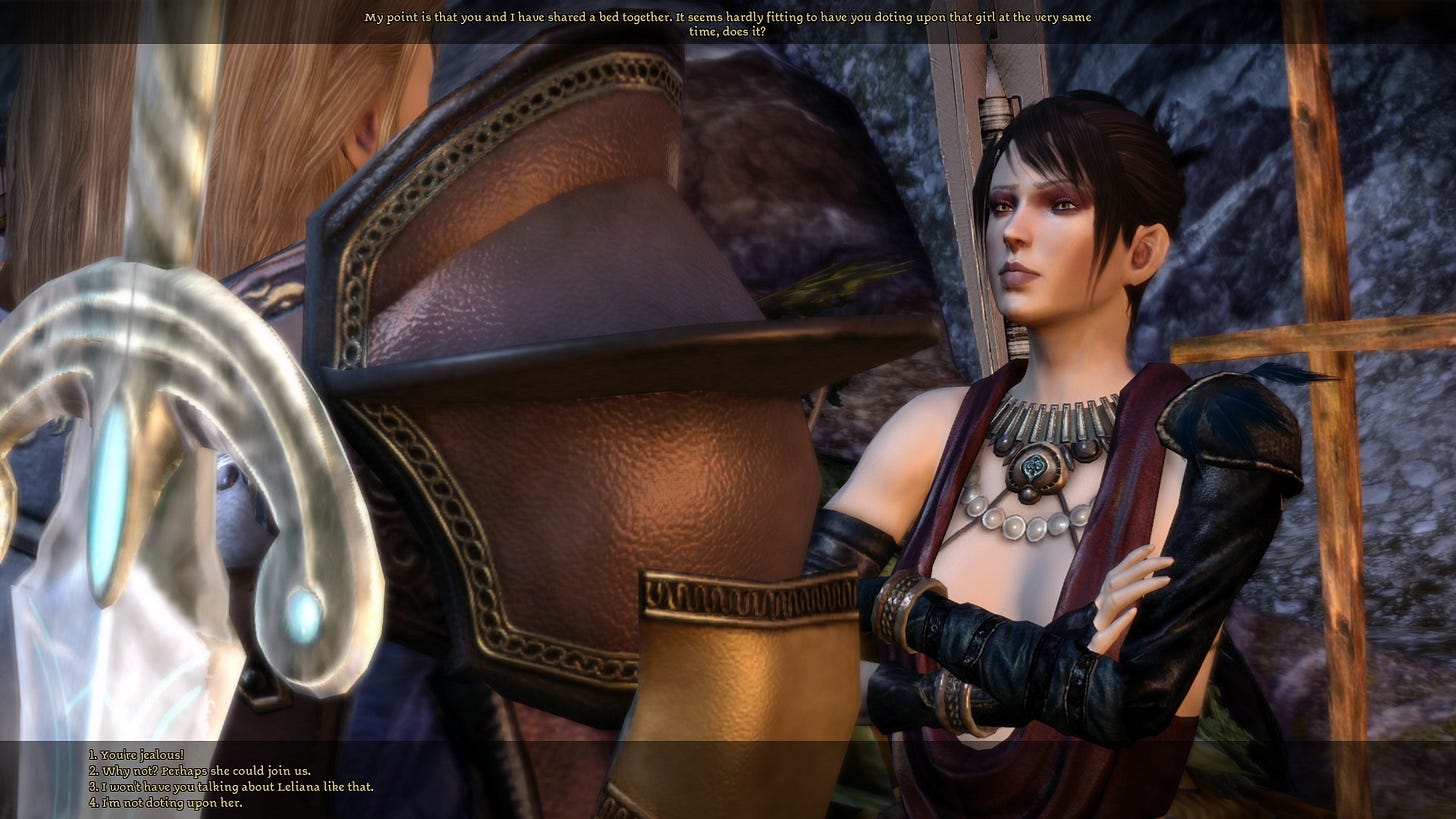
You can't click on the characters in II to talk to them. You can only initiate conversations with them in their homes, and only if the game has decided it's time for such a conversation to take place.
This ruins the magic. Dialogue trees are the lifeblood of cRPGs. Inquisition has them. All of the Mass Effect games have them. Origins has them. But Dragon Age II does not have them, not really, and especially not for its companions.
The Story
It's a little known piece of trivia that Dragon Age II had another subtitle while in development, much like Origins and Inquisition. See, originally, David Gaider had wanted to call the game Dragon Age: Go Solve Other People's Boring Problems For Them, but EA determined that this was too long. So they cut it down to just II instead.
The story is what I ultimately like least about II in replaying. Overcoming an unlikable cast was going to be a tall order, but I could have done it if I found the plot interesting and engaging. I did not, not now or ten years ago.
General Storytelling Stuff
Dragon Age II takes place entirely in Kirkwall over the course of six or so years and three acts. The first act sees Hawke gathering funds for an expedition into the Deep Roads. The second act sees Hawke caught in the midst of the war with the Qunari. The third act sees tensions between the mages and the Templars explode into open war.
You may notice that none of these three things has much to do with any of the others.
This game does not have a "plot;" that is to say, there is no central goal or driving force to the action that propels the story. Things are more character driven, smaller scale, more personal.
This is interesting in theory, even though the reason for doing the game this way is almost certainly because BioWare needed to rush this game out (and so came up with a narrative that would allow them to recycle the same environments over and over and over again most effectively).
Surprisingly the story itself doesn't drag that much. Stuff is always happening. But the way in which the narrative is connected doesn't do it for me.
Every act has a bunch of side quests and then a final confrontation that serves as the transition into the next section of the game. And each time, especially in the second and third acts, that transition feels like it comes out of nowhere.
I'll admit it here: I was rushing to finish this game so I could get the review done by today. I would have rushed it anyway because I was not having fun. I tried to do every companion quest and whatever else sounded interesting, but I probably missed some stuff.
Still, upon reaching each act break, I couldn't escape the feeling that things hadn't been properly set-up. The game kept introducing new characters like Meredith and Orsino all throughout, despite the fact that they're the game's major antagonists (sort of)--and we don't meet them until the story is almost over!
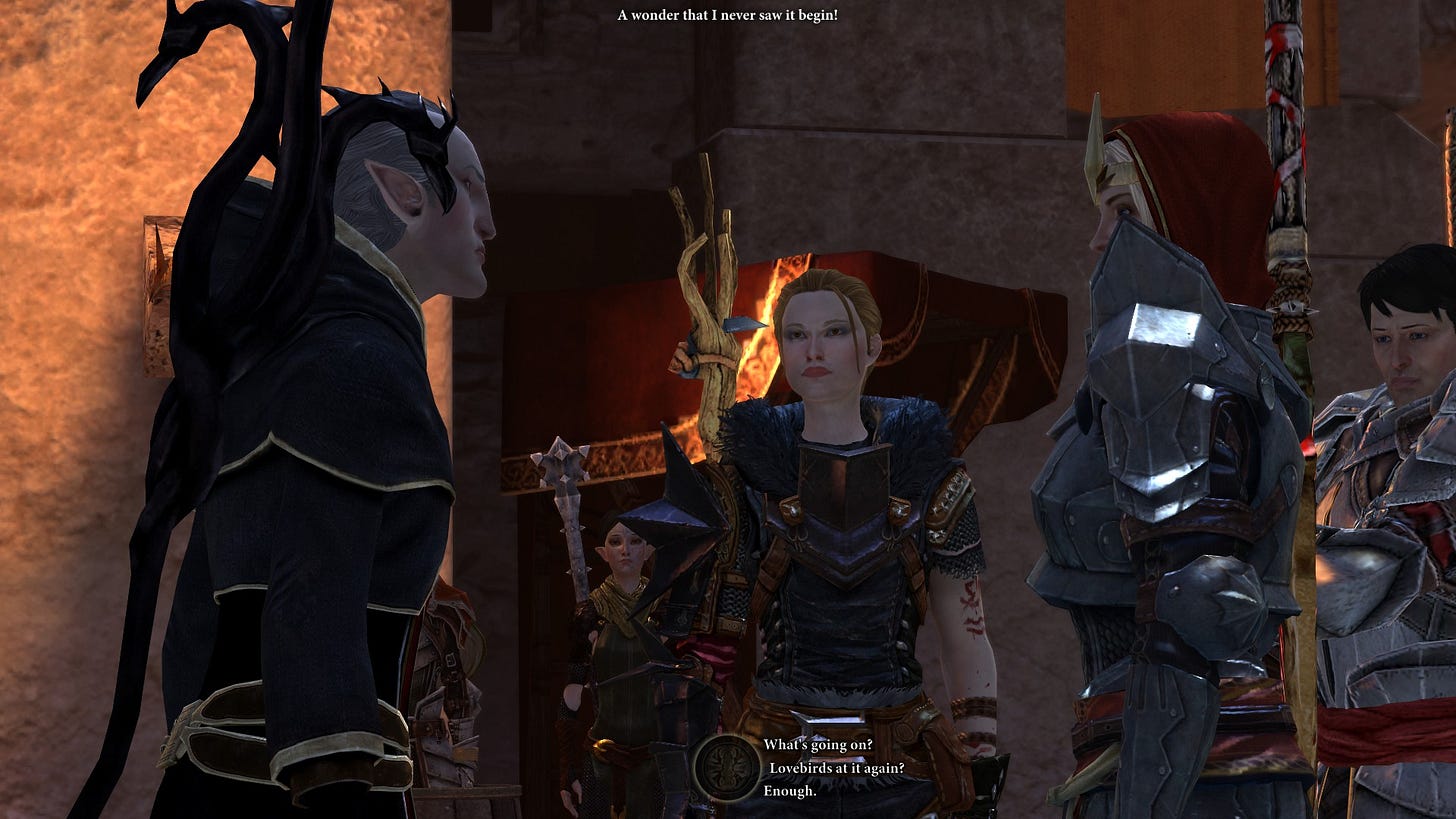
So many main story quests feel like they lack set-up before their pay-off. "'Til Death Do Us Part," the questline in which your mother is murdered, is haunting--but where in the Maker's name did the reveal that this serial killer had targeted Leana come from? The resolution for this entire chain is that this dude wants to use necromancy to animate Hawke's mom because she looks like his old girlfriend or something, but...where was this established? What hinted at this? That resolution comes out of nowhere!
Meanwhile, as indicated in the beginning of this section, most of the questing is Hawke going to some place to deal with some problem that someone else is having. You have to do a lot of these "side" quests to progress the main plot, and I just don't find this model compelling.
A lot of RPGs see the PC go somewhere, Yojimbo two factions, and resolve their differences. It's a very repetitive formula that every game in Dragon Age follows. It works in Origins and Inquisition because helping other people and uniting their factions with yours is how you advance your own goals--to defeat Corypheus, to slay the Archedemon. You have a personal stake in the business at hand.
But in II, who the fuck cares about some dude's sister? Or some elf's son? Or escaped blood mages? The only reason Hawke has to help these people is out of altruism. She gains nothing from it in the vast majority of quests.
If you, like me, struggle with chronic apathy, this is a death sentence. I don't care about these people's problems. I want to advance my own goals. But Hawke doesn't have any goals in DAII. She's just there to help and fight people.
This is the problem with the structure of the story.
If BioWare wanted to tell a personal story, that's fine by me. But Hawke needed something to actually do. Some duty, some personal task, revenge, clearing her name, whatever. A goal for me to root for. Instead she has nothing. That means the player has nothing, which means I'm bored.
Player Agency
Worse than the plot is how robbed I feel of agency all throughout the game. Hawke is allowed to genocide her way through Kirkwall to her heart's content, but when betrayed by a questgiver all she can do is yell "I'm gonna get you!" and shake her fist...while letting the bad guy go.
WHAT???
HEY HAWKE, PETRICE IS RIGHT THERE. JUST FUCKING MURDER HER. YOU'VE MURDERED FAR MORE PEOPLE FOR FAR LESS. SHE'S EVIL. STOP LETTING HER ESCAPE! HAWKE!
I wanted to side with the Qunari all game--I find them interesting--but apparently I made the wrong decision at some point in an earlier quest and was hardlocked out of being friends with the Arishock...even though I thought I'd done everything to his benefit all throughout the game. So I had to duel him instead.
I wanted to save Leana, but I couldn't, because her death was pre-ordained.
I wanted to kill Anders after he murdered that innocent woman in the sewers or wherever, but I couldn't, I could only tell him to GTFO of Kirkwall.
I wanted to convince Merrill that she was fucking insane and that I would kill her if she didn't stop remaking the Eluvian, but I couldn't.
I wanted to tell Aveline to go get bent, but I couldn't.
I can't even begin to express how many quests there are in this game that feel like they should end with cool dialogue trees, but instead end with some railroaded fight that doesn't really make sense.
Credit where credit is due, the game did allow me to tell Carver, Isabela, and Anders all to go fuck themselves, but that barely changes the outcome of the story anyway. In fact telling Anders to leave Kirkwall doesn't change anything--he still appears later on in Act 3.
People say that DAII respects player choice, but I don't see it. Despite being much smaller than its prequel and sequel, it's practically on rails when compared to either. And ultimately, Qunari or viscount, mages or Templars, no matter who you side with, the outcome is cosmetic at best. More or less the same story beats will happen. Anders will still blow up the Chantry, the Qunari will still leave, the mages will still rebel and all turn to blood magic.
Mages vs. Templars
All of DAII ultimately comes down to the dilemma of Dragon Age: mages, or templars? Who will it be?
Any sane person should conclude that the power of blood magic is far too terrible to leave unchecked. Any sane person should also conclude that keeping people imprisoned because of how they were born is wrong. Siding with the mages, therefore, should be an easy choice--especially if, like me, you're a mage. The only rule we need is that anyone found using blood magic or bartering with demons will be instantly and summarily executed.
But the game doesn't let you do that, and everything falls apart.
Anti-mage 'bigotry' in Dragon Age is all rooted in the hypothetical prejudice that every mage is a maleficar or abomination waiting to explode. In the first game this is obviously untrue: even the more unsavory mages beyond the Circle, such as Morrigan, are seen rejecting both demons and blood magic. Mages are dangerous, yes, but they aren't literally all evil.
Except in Dragon Age II, every mage IS a maleficar. Literally all of them. I'm not joking. Every single one. The only exception is the guy who was just pretending to be a blood mage, in the Hanged Man, and potentially Hawke herself. Even First Enchanter Orsino, who I sided with, who was perfectly safe under my protection, decides to turn into a demon at the drop of a hat.
So I guess Fenris and the Templars are right, after all. Mages are just bad. We should kill all of them. They're clearly irredeemable. The Circle is a lost cause.
Not that the Templars are any better. Meredith's perspective on this issue is completely unhinged. The obvious implications of the story are that, were the Templars less oppressive, there would be less blood magic. This results in a causal circle. Mages use blood magic because the templars are oppressive, and the Templars are oppressive because the mages won't stop fucking using blood magic and turning into motherfucking demons that kill thousands of people and destroy Thedas.
Mages: "why do you people treat us all like blood mages and abominations?!?"
Also Mages: *does blood magic*
Hawke: "y tho"
Different Mages: "#notallmages"
Also Different Mages: *does blood magic for no reason*
The way that both sides are written turns what could be an interesting philosophical dilemma into an exhausting slog. Mages or templars, who will it be?
They're both so bad that I just don't care.
A lot of people online give Gaider and his team credit for having this issue be so 'gray' and 'nuanced,' and while it certainly is an ambivalent choice, each faction needed to be right about something. Instead, they're both wrong about everything. This isn't choosing between two reasonable sides, this is deciding if you'd prefer AIDS or cancer. Let's weigh the benefits of each!
Cancer: "Well, it might be cured eventually with chemotherapy, and you'll get to lose a lot of weight!"
AIDS: "But with a few pills AIDS is hardly a death sentence these days!"
As Geralt says, when it comes to choosing the lesser of two evils, I'd rather not choose at all. Mages and Templars are equally bad. The game did not have to be written this way, but it is. The consequence is that I just don't care. My solution to the problem?
Kill all of them. Mages, Templars, whatever. They all deserve to die. Every single mage is evil in this game, including both of the companion NPCs, and the templars are oppressive fascists. Let's kill both and call it quits.
That is unfortunately not an option.
In Conclusion
The worst thing I can say about Dragon Age II is that, preparing to import my save into Dragon Age Keep to get it ready for an Inquisition playthrough, I just don't care about any of my choices. Mages or Templars? Qunari or viscount? Kill Bartrand or let him go?
It doesn't matter. I might as well just hit randomize. I don't care. In fact the only decision I do feel strongly about is that Anders has to die; all else could be changed and I wouldn't even notice.
This is a far cry from Origins. It's been nearly twelve years and I still stay up late at night thinking about whether or not to do the Dark Ritual, or whether to keep Alistair in the Gray Wardens, or if it's better to destroy the Anvil of the Void or let it be.
I've been trying hard to think of positives to II while writing this review and I can't come up with a single thing I truly enjoy. Even Varric, as much as I like him, hardly sticks with me in the way Alistair and Morrigan do. So it is with heavy fingers that I say I wouldn't recommend Dragon Age II to anyone, not even fans of the series. Just stay way. Your mileage may vary with the characters, but the story is too flimsy and the narrative too exhausting for it to be worth the time and effort.
And it's completely unnecessarily anyway. Inquisition is the real sequel to Origins, not Dragon Age II. So load up the Keep, hit the randomize button, import you Origins save, and skip II altogether. I don't intend to ever play it again.


